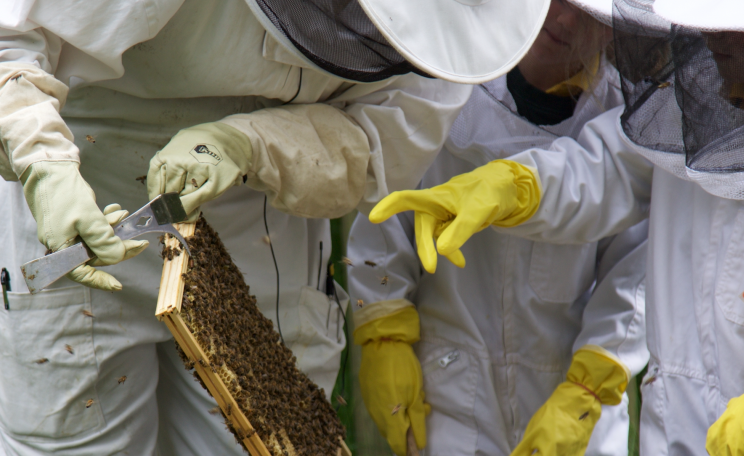35 species of UK bees are under threat of extinction, and all species face serious threats.
There’s a buzz around honey. National Honey Bee Day was held again this month– an event which has been running since 2009 in order to "honour honey bees and beekeeping".
Since pollinators such as bees play a fundamental role in the environment and in our food system, we are often made to feel as if supporting honey production is a must-do for the environmentally-minded. However, dig a little deeper and it’s clear that this industry has a sting in its tail.
But let’s rewind. One thing we can all agree on is that bees are in trouble. According to Friends of the Earth, 35 species of UK bees are under threat of extinction, and all species face serious threats.
Ecosystem
Protecting vulnerable species is always our responsibility, regardless of whether there is anything to gain. However, if the bees are in danger, we’re all in danger. Bees are responsible for pollinating about a sixth of the flowering plant species worldwide, and approximately 400 different types of agricultural plant. A world without bees is a world in which meeting the nutritional needs of our growing population becomes next to impossible.
Initiatives such as National Honey Bee Day highlight the importance of bees to the ecosystem as a whole – but citing beekeepers as a vital part of the solution is a big misstep. There are fundamental aspects of the honey industry which pose a threat to bees.
Firstly, we must examine why bees produce honey. Honey is created as the bees’ source of nutrition – it is perfectly suited to fuel their bodies. They eat it, feed their young with it and store it for the winter months.
Beekeepers replace honey with a sugar substitute which is inferior for bees’ health. If we are trying to protect these animals, it is logical not to deprive them of their ideal source of nutrition. While some beekeepers claim to only take ‘surplus’ honey, it is not possible to judge how much the hive requires to function optimally.
The bottom line is that protecting bees and, by extension, the rest of the ecosystem and ourselves, should be its own reward without wanting something sweet in return.
Industry practices
The honey industry also involves many practices which clearly are not in the best interests of bees, and instead only serve to improve profit margins.
For example, in large-scale bee farming, sometimes the hive is culled after the honey has been collected as this is cheaper than keeping the bees alive over winter. Another practice is ‘smoking out’ bees when honey is collected, which is done to make the bees less likely to defend themselves.
35 species of UK bees are under threat of extinction, and all species face serious threats.
Bees are also bred for productivity which narrows the gene pool and makes them more susceptible to die-offs.
Colonies are sometimes shipped around, especially in the US, to pollinate specific crops - such as almonds. This means that their hibernation is disrupted and could lead to the spreading of mites and diseases.
Habitat
Another reason bees are struggling is due to the changing nature of the landscape. Wildflower meadows are what suit bees best – but an astounding 97% of these have been lost since the 1930s.
The main culprit is our modern industrial farming methods. Woodland and grassland have steadily been lost to provide space to farm animals on – or land to grow crops to feed to farmed animals.
One way this can be helped is by a shift to a more plant-based diet, which naturally requires far less land to be used for food production.
The production of plants also creates less greenhouse gas emissions, and as climate change is also thought to be disrupting bees, the effects of this are win-win.
Take action
If you think leaving honey off your plate won’t make a difference, remember that everything you buy is a vote for the industry which made it.
By switching to one of the numerous alternatives, such as date syrup, maple syrup, golden syrup or agave syrup, you can show your support for bees.
Planting wildflowers is also a great way to help your local bee population, and you don’t have to be particularly green-fingered to pull this off.
For example, bee bombs only require chucking onto any patch of grass or earth. There is also currently a trend for allowing your lawn to grow out and become an insect-friendly haven. That’s what we like to see – environmentally conscious actions which also save time!
Human activity is undoubtedly playing a part in the decline of bee populations. This means that we are culpable but also that there is hope – it is within our power to make a difference.
This author
Elena Orde is communications and campaigns officer at The Vegan Society and editor of The Vegan magazine







